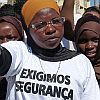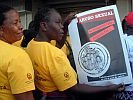Those pregnancies that embarrass schools
Maria José Arthur and Zaida Cabral
The number of adolescents falling pregnant is increasing and this represents, above all else, a public health problem. Young people are starting sexual life earlier and earlier, sometimes at the age of 11 or 12 and the prevailing practice is unprotected sex, which can result in HIV infection and pregnancy, with all the ensuing consequences for their health and future lives. If girls choose to have an abortion, an illegal one for sure, complications are to be expected and these can often result in death (see the article by F. Machungo in this edition). If the pregnancy goes ahead, it can also be expected that the girl will develop a gynaecological fistula at the birth (which is a solvable problem if she has access to a hospital, but it may become a personal drama in rural areas where there is little health care), and that her development will be delayed, because she herself is still growing.
Because of this, pregnancy in such young adolescents is also a human rights problem, all the more serious because we are talking about girls that are almost children and are at all events under 18. And as a society we are responsible for these girls. This responsibility includes access to information about their bodies and their sexuality, the creation of space for discussion, so that sex education is given more than just physiological coverage, but responds to the emotional concerns of young people. We are talking about very concrete rights, which are usually overshadowed and are rarely acknowledged – sexual and reproductive rights (see the highlight about the 28th of May in this edition). Respecting these rights means, among other things, teaching and helping young people to have a responsible and gratifying sex life, where the right to pleasure is allied with respect for others and respect for one’s own body.
For these reasons, we reject a moralistic approach to the problem of pregnancies among adolescents. In reality, it is not they that offend society, but society and its institutions and members that are exposed as having failed in this essential mission, the mission to guarantee that our children and youth grow up enjoying security, love and the support they need in order to grow into responsible adults and citizens in full enjoyment of their rights. Adolescent pregnancies show that something, somewhere has failed. The schools, whose function is not just informative but also educational, have failed, and so have the State institutions. Our inefficiency, or our disinterest, is exposed.
It is against this background that dispatch number 39/GM/2003 issued by the Minister of Education (see the text box alongside) should be analysed. We would like to highlight the following:
- The first four paragraphs of the dispatch give a justification for the measures being proposed. This justification emphasises the value of education (scientific, technical, cultural, physical, moral, civic and patriotic) for building a just society that respects equal rights, the need for everyone, inside school and out, to participate in this project, and the fact that a “bad environment” is created in schools because of pregnancies among pupils, which pregnancies are brought about “fundamentally… by the teachers themselves”.
- The disciplinary measures determined in this dispatch extend first to “teaching staff and other education personnel linked to schools”, who impregnate or sexually harass pupils. They then go to cover pregnant pupils and those responsible for their pregnancy, if they are pupils at the same school, who are barred from attending daytime classes at elementary, basic and intermediate levels.
First and foremost, adolescent pregnancy, a question of public health and human rights, is presented with moral connotations, the consequence of which is that it creates a “bad environment” in schools. At no point is there any show of concern for the adolescents in question, who are held fully responsible while the school is discharged of its responsibility. We might ask what the schools did to integrate, support and educate those same adolescents.
Then the document raises another problem, which is much more serious than adolescent pregnancy. It acknowledges that there are many teachers who sexually abuse their female pupils, which, apart from being a serious ethical violation, is an offence punishable by law.
In Mozambique, where recognition of women’s human rights is growing, this dispatch is scandalous in several respects and we suggest that we should give more attention to the matter.
Systematic and constant impunity of teaching staff that sexually abuse their pupils
As regards the corrective measures that the dispatch establishes, we do not quite understand:
- What is being punished? – The dispatch says nothing about “sexual abuse”, it says only that there will be sanctions against those who “impregnate” or commit sexual harassment, without explaining what is to be understood by “sexual harassment”, even though this is not a concept that exists in the current Penal Code. So, for all intents and purposes, will sexual abuse that does not result in pregnancy not be punished?
- And what will the penalty be? – As regards teaching staff and education personnel who sexually abuse their pupils, it is said only that they will be suspended without pay. How long for? And what then? Will they return to teaching so they can abuse another pupil?
So, as we have seen, the objective of this decree is not to put a stop to the scandal of sexual abuse of pupils by teachers. It only aims to punish those cases that result in pregnancy. However, even with regard to these cases, account needs to be taken of the complicity of colleagues, school directorates and district and even provincial directorates of education, as experience as shown us (see the reports of sexual abuse of little girls and teenagers in schools contained in material published in an earlier edition of this bulletin1).
This impunity and complicity is not a thing of the past. On the contrary, it goes on every day. Recently, in February this year, worrying information emerged, compiled by the League of Children’s Rights in Zambézia (Liga dos Direitos da Criança na Zambézia – LDC), the Association of Mozambican Women for Education (Associação das Mulheres Moçambicanas para a Educação – AMME) and Action Aid, operating in the same province. These organisations are currently conducting a more consistent survey, as part of the provincial campaign against the abuse of minors.
These are some of the facts:
A teacher raped an 11-year old female pupil who had to receive surgical treatment at the Provincial Hospital in Quelimane.
It transpired that the same teacher taught previously at Maganja da Costa, where he killed a pupil by striking her, and this was the reason he was transferred to Alto Molocué.
A teacher who held the office of District Secretary to the ONP was accused of raping a 13-year old girl. He alleged that he was testing his sexual potency.
A teacher raped and impregnated a pupil. There are indications that he threatened his pupils for reporting his conduct. The same teacher raped four pupils living in halls of residence, and he threatened them to dissuade them from testifying against him.
A school director sexually abused two pupils, who became pregnant. In one of the cases, the education department gave no attention to the parents, who were unable to have the offender punished. Both girls left school.
These different cases tell the same story about criminal impunity and complicity, and common patterns are evident. First, teachers who sexually abuse their pupils continue to teach and are not punished in any way, or they are simply transferred from one school to another, from one district to another. Second, there is also evidence that local education institutions, contrary to the provisions of the current Penal Code, do not consider that sexual assault of minors is a crime. At best, they call it a “weakness” and their discourse seeks to minimise the issue. If a case takes on greater proportions, the rapist is ordered to pay compensation to the parents of the victim. The result of this policy of impunity is that criminals not only go unpunished, they continue to teach and they almost always re-offend. Thus, internal disciplinary proceedings are not brought, nor does the school refer the issue to the police authorities so that the rapist can be held criminally liable for his acts.
Nevertheless, even without support from the school, the victim’s parents sometimes approach police stations in order to file a complaint. In these cases, according to information from LDC and Action Aid, the issue is minimised, because sexual abuse, whether in the public or in the private sphere, is considered as a “family issue”.
In the light of this situation, it is clear that the corrective measures intended for teachers who “impregnate” pupils are a dead letter. All that remains is the PENALTY contemplated for the pregnant adolescents, who carry “proof of the crime”.
Shouldering the blame
Considering the aforesaid, it is shocking that the main concern of the dispatch of the Minister of Education is the visibility of the girls’ pregnancy, rather than the repercussions that it will have on their lives.
When the dispatch says that the pregnant girl must, compulsorily, be transferred to night classes – if there are any – even if she wants to stay where she is, there is no doubt that this is clearly a punishment or penalty. But we ask ourselves, why a punishment or penalty? Is it because she had sexual relations without being married, or because she is under 18 years old? Is she being punished for falling pregnant?
Thus, when pregnancy results from sexual assault by a teacher (which the dispatch acknowledges is a frequent occurrence), we have a young adolescent who receives a double sentence: she suffered sexual abuse and now she is being punished for the consequences. She goes from victim to culprit, shouldering the blame – alone – because of the impunity of the aggressors when they are members of the school staff.
And if the pregnancy is a consequence of a consensual relationship with another youth – will the boy also deserve the contemplated punishment?
As for me, one fundamental doubt remains: can there be any valid reason to justify considering pregnancy a crime and, as such, subject to punishment? It is not in the name of human rights that this stance is taken. Nor is it the result of a concern for the sexual and reproductive health of young girls. The reasons can only be moral ones, derived from a morality that restricts the exercise of sexuality to the confines of marriage and punishes those who offend against it. Pregnancy can only be perceived as creating a “bad environment” in schools if it is perceived from this point of view.
Therefore, let us stop being hypocritical and state clearly how things are going to be from now on:
- Pregnant girls will pay for everyone – for the teacher who raped her (if such is the case), for the school that did not teach her to understand the value of a healthy and responsible sex life, and for all those who left her without support and guidance.
- Only rarely can a girl who falls pregnant continue with her schooling – either because the school does not have night classes or because, being at night, it is not safe for her to go there daily.
Thus, to the punishment that the girl will suffer from her family and her close social environment, we can add the penalty that the school imposes on her. After failing to perform its educational duty, the school points a finger at these adolescent girls and punishes them. It removes them from the system.
The dispatch also mentions that the same punishment is applied to the “author” of the pregnancy, if he is a pupil at the same educational establishment. But it is not even worth discussing this measure, first because it will be difficult to put into practice and second because the adolescent boy has committed no crime, with the exception of rape cases.
Is there no hope?
It is disheartening to see that the daily and routine violation of women’s human rights continues to be a reality, despite all the national legislation and International Conventions, despite a climate that claims to be a climate of democratisation. Moreover, in this case it is the human rights of girls that are being overridden, and by an institution as important as the school. Schools that should educate, guide and prepare are expelling and discriminating against the very adolescent girls that they failed to integrate. Not to mention the painful and monstrous reality of sexual assaults on school children. Assaults which are doubly shocking because they are committed against those who are under the State’s care, in places that are supposed to be for learning about citizenship and promoting a culture of equality, peace and non-violence.
One last question, Minister: how are you going to improve the environment in schools by discriminating against adolescent girls?
- M.J. Arthur, 2003, “Assédio sexual e violações nas escolas”, In: Outras Vozes, nº 3. (This article has not been translated into English.)
Ministry of Education – Office of the Minister
Dispatch number 39/GM/2003
Building a socially just society based on the upholding and protection of equal rights for all citizens in general requires a balanced education policy that valorises the education of citizens, with sound scientific, technical, cultural and physical preparation and a high moral, civil and patriotic education, which are the foundations on which the objectives pursued by the National Education System are based.
To achieve these objectives, internal mechanisms in the education sector must be created so that the policy is made effective for everyone, with the involvement not only of personnel linked to the education sector but the whole of civil society as well.
A bad atmosphere is created in the school by the high rate of educational loss (wastage) that occurs because girl pupils become pregnant during the school year, and also fundamentally because this is brought about by the teachers themselves, who overstep the professional nature of their relationship with girl pupils, to the detriment of their own function.
Therefore, it is necessary to adopt measures to prevent and censure this phenomenon.
Thus, in the light of article 3(d) of Law 6/92, of 6 May, on the National Education System, and in keeping with article 3(7) of Presidential Decree 16/2000, of 3 October, I decide, with immediate effect, that:
- Teachers and other education personnel associated with schools, who impregnate pupils that attend those same schools, as well as those who sexually harass pupils, shall be suspended from service without pay and shall be declared offenders in disciplinary proceedings.
- Pupils who are pregnant, as well as the authors of their pregnancy, where these are pupils at the same school, shall be barred from attending daytime classes at elementary, basic and intermediate level in the National Education System.
- Where schools do not have night classes, pregnant pupils shall be authorised to attend daytime classes, on the decision of the school board, whenever such is justified.
- Any doubts arising from the interpretation and application of this dispatch shall be remedied by dispatch of the Minister of Education.
Maputo, 5 December 2003
Signed: Alcido Eduardo Nguenha, Minister of Education
* * *







 Information in English
Information in English



















